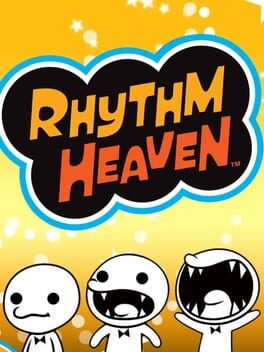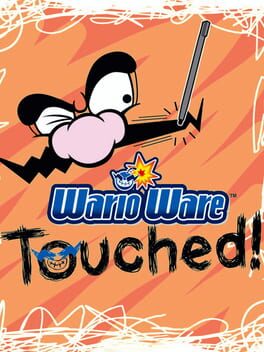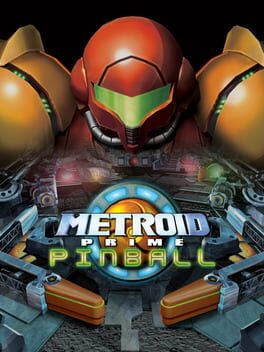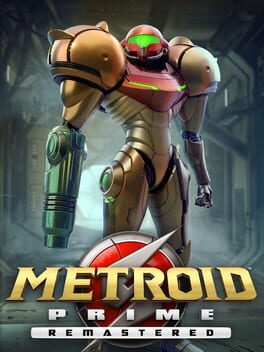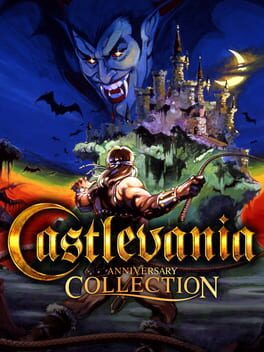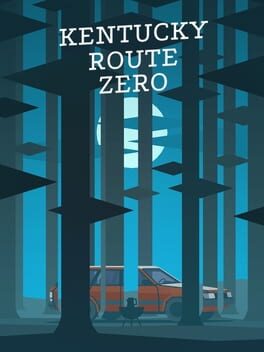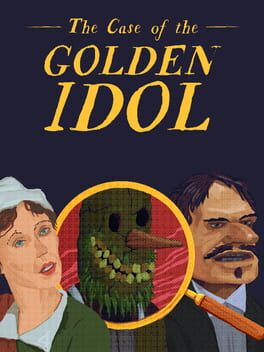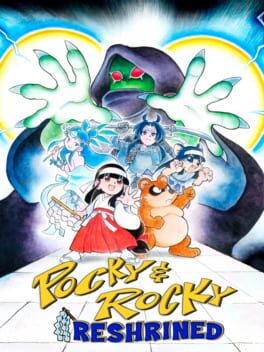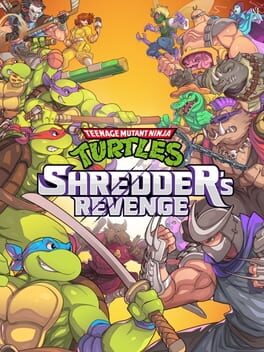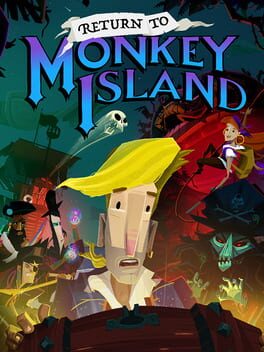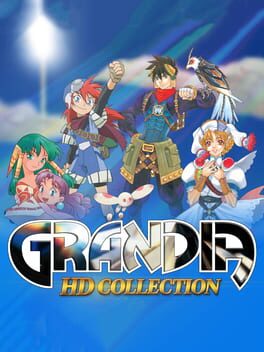big_douglas
2006
Hard to emphasize enough just how silly this game is and what a genius idea it is too. The gameplay is really tough but mainly fair, the comic book illustrations are goofy and even heartwarming at times (and in the case of a sort of christmas themed level, a bizarre tonal whiplash that had me honking like a damn goose)
2008
Surprisingly high-quality and with a lot of great challenge and creativity to the rhythm games. Even using the coins you earn to play around with simple rhythm "toys" or minigames was a really charming touch. The game has so much heart to it while also taking its central mechanics seriously. I just wish I was better at it!
2004
Played this on my DS parallel to my playthrough of Metroid Prime Remastered on the Switch. In theory it sounds like a logical pairing but in practice it feels kind of unhinged.
The game itself is pretty fun, there's some good variation in the levels and the way it follows the gameplay of its source material is a cool choice. I suck at pinball too much to beat it but I did see a good deal of it before putting it down. It's good enough quality that I'll likely pick it up when I want to play some pinball in the future.
The game itself is pretty fun, there's some good variation in the levels and the way it follows the gameplay of its source material is a cool choice. I suck at pinball too much to beat it but I did see a good deal of it before putting it down. It's good enough quality that I'll likely pick it up when I want to play some pinball in the future.
In a year where remasters and remakes loom large in gaming discourse, Metroid Prime Remastered stands as an example to strive for while asking questions of its own.
Metroid Prime Remastered faithfully maintains what fans of the original loved and what made it a modern classic. The game impressively translates Metroid games into 3D and explores what that extra dimension means for the series. The remaster itself preserves the gameplay while updating the tech, visuals, and controls for the modern hardware. In many ways it's the ideal remaster in that it seeks to change as little as possible from the original version while also making that original version obsolete.
Where it becomes questionable is perhaps where it doesn't update the tech/gameplay. There are a good few quality of life improvements made by this new version, and though I lack the game design experience to know if it would interfere with gameplay I do think it's not great that if you die you have to do EVERYTHING over again. As in even scanning and gathering data.
There were times also that I felt the first-person combat was kind of obnoxious, such as when surrounded by certain enemies. Sure it succeeds in making you feel overwhelmed and surrounded, but it's often also just annoying and frustrating. Sometimes you just get sniped to the bottom of a level because of an enemy you had no chance of seeing too.
All that said, it's a really impressively designed game that translates the best of 2D metroid into a 3D space, and this remaster both looks and runs incredibly on the Switch hardware.
Metroid Prime Remastered faithfully maintains what fans of the original loved and what made it a modern classic. The game impressively translates Metroid games into 3D and explores what that extra dimension means for the series. The remaster itself preserves the gameplay while updating the tech, visuals, and controls for the modern hardware. In many ways it's the ideal remaster in that it seeks to change as little as possible from the original version while also making that original version obsolete.
Where it becomes questionable is perhaps where it doesn't update the tech/gameplay. There are a good few quality of life improvements made by this new version, and though I lack the game design experience to know if it would interfere with gameplay I do think it's not great that if you die you have to do EVERYTHING over again. As in even scanning and gathering data.
There were times also that I felt the first-person combat was kind of obnoxious, such as when surrounded by certain enemies. Sure it succeeds in making you feel overwhelmed and surrounded, but it's often also just annoying and frustrating. Sometimes you just get sniped to the bottom of a level because of an enemy you had no chance of seeing too.
All that said, it's a really impressively designed game that translates the best of 2D metroid into a 3D space, and this remaster both looks and runs incredibly on the Switch hardware.
The collection itself is very well executed, including the original Japanese versions of the games alongside a first-ever English localization of Kid Dracula. The inclusion of the option for creating save states and different picture modes gives it a decent amount of flexibility for the player to get the best experience they can out of it.
Catlevania
Personally I went into it without any experience of the series and didn't know the Japanese versions are superior, so the difficulty of the first three bucked me off the games usually around 75% of the way in. This first game has such great music and atmosphere, controlling the character felt good but some stuff felt not really fine-tuned in the levels and veered into "this is bs" territory. I still feel a compulsion to beat it so I definitely will one day soon.
Castelvania II
Simon's Quest was initially much more fun and interesting to me than the first. The fact that someone had the realization this early on that an explorable world with non-enemy npcs and more of a present story in the world would be the way to go for the series was really impressive. It became sort of cumbersome to navigate and figure out though.
Castlevania III
Huge leap in every regard, the boss designs especially soar. The flexibility of being able to switch characters and alter your playthrough by taking different paths really make it timelessly enjoyable.
Castlevania IV
A departure aesthetically in many regards but I really liked it just the same. Sometimes the difficulty spikes would get really nuts for someone like me who isn't exactly excellent with reflexes.
Vampire Killer
Maybe my favorite of the collection, and the only one I fully beat. So creative and the fights felt really tough but actually were well-tuned enough to feel fair. In previous games it seemed sometimes like they didn't have a winning strategy in mind when designing a boss and just figured a skilled enough player would be able to make one up on their own. The visual tricks and variation in the level designs make it a premium experience.
Castlevania: The Adventure
Lots of cool stuff going on and good level design, but the performance is horrible (it was originally as well so this is just an accurate emulation) and the hitboxes on some enemies is truly whack. It's a learning experience in itself to try and figure out just how far outside the actual pixels of an enemy their hits will land. I made it to the final form of the last boss but after a few attempts figured I should move on.
Belmont's Revenge
If you can only play one of the GB games, play this one. Performs great, looks amazing, great level design, cool bosses.
Kid Dracula
Aesthetically really fun and cool, but gameplay wise it's kind of bs in my view. The game is a lot about failing over and over to learn exactly when and where something is going to shoot across the screen and knock you to your death, and that amount of backtracking after getting killed by something you had little chance of reacting to was not a great feeling.
The bonus art book with interviews and gameplay tips is a recommended read to, especially before you play the games because there are some vital bits of gameplay mechanics tips in there.
Catlevania
Personally I went into it without any experience of the series and didn't know the Japanese versions are superior, so the difficulty of the first three bucked me off the games usually around 75% of the way in. This first game has such great music and atmosphere, controlling the character felt good but some stuff felt not really fine-tuned in the levels and veered into "this is bs" territory. I still feel a compulsion to beat it so I definitely will one day soon.
Castelvania II
Simon's Quest was initially much more fun and interesting to me than the first. The fact that someone had the realization this early on that an explorable world with non-enemy npcs and more of a present story in the world would be the way to go for the series was really impressive. It became sort of cumbersome to navigate and figure out though.
Castlevania III
Huge leap in every regard, the boss designs especially soar. The flexibility of being able to switch characters and alter your playthrough by taking different paths really make it timelessly enjoyable.
Castlevania IV
A departure aesthetically in many regards but I really liked it just the same. Sometimes the difficulty spikes would get really nuts for someone like me who isn't exactly excellent with reflexes.
Vampire Killer
Maybe my favorite of the collection, and the only one I fully beat. So creative and the fights felt really tough but actually were well-tuned enough to feel fair. In previous games it seemed sometimes like they didn't have a winning strategy in mind when designing a boss and just figured a skilled enough player would be able to make one up on their own. The visual tricks and variation in the level designs make it a premium experience.
Castlevania: The Adventure
Lots of cool stuff going on and good level design, but the performance is horrible (it was originally as well so this is just an accurate emulation) and the hitboxes on some enemies is truly whack. It's a learning experience in itself to try and figure out just how far outside the actual pixels of an enemy their hits will land. I made it to the final form of the last boss but after a few attempts figured I should move on.
Belmont's Revenge
If you can only play one of the GB games, play this one. Performs great, looks amazing, great level design, cool bosses.
Kid Dracula
Aesthetically really fun and cool, but gameplay wise it's kind of bs in my view. The game is a lot about failing over and over to learn exactly when and where something is going to shoot across the screen and knock you to your death, and that amount of backtracking after getting killed by something you had little chance of reacting to was not a great feeling.
The bonus art book with interviews and gameplay tips is a recommended read to, especially before you play the games because there are some vital bits of gameplay mechanics tips in there.
2013
This review contains spoilers
Kentucky Route Zero is a work of art, abundant with thematic meaning for the player to interpret freely.
It's clear very early on that you likely will never reach your destination in this game, which turns the focus to what the intention is behind that creative choice. The magical realist storytelling puts in question what the nature is of the reality you find yourself in. Route Zero itself is a loop in something of another dimension, reached and navigated by preternatural means. The first thing you find in that surreal place is an odd bureaucracy carrying out the vague and mundane work of "reclamation" of disused places. The other tangible point of interest on the route is a massive storage facility for their paperwork. And yet there is wonder everywhere, small bends in the fabric of reality. What are we supposed to make of all this?
Thematically it is about the search for meaning-- that is, the search itself. Many characters enter the story, and the game at a critical point untethers you from who you think "you" are, from that point having you control and select dialogue options from an array of present characters across its many setpieces. Who you are, who they are, the nature of reality itself, these things are always in flux, and due to your ability to choose from an assortment of contradictory dialogue options at certain points as well, the nature of the individuals themselves and their motivations are even subject to fluid change and interpretation. So what is constant here? The presence of these people, the presence of motivation and destination, the presence of their pasts they carry with them as they go.
It's a story colored by a profoundly deep sense of loss, yet dulled in the way only those who have experienced great loss can know. An almost throwaway line in the last act stopped me in my tracks, "Wouldn't it be nice to be around at the start of something, for a change?". I felt it summarized the whole experience, of people always in the middle of something or picking up pieces in the aftermath.
Though the purgatorial themes of the story are clear and present, the more I played the more I came to a message that put a different perspective on it. See, there are throughout the game ends that are not ends, continuations that are not continuations, explanations that can't be satisfied and satisfactions unexplained. Very much a purgatory, but the other side of it is that there isn't abject misery. Even if the conditions for misery are expressed by the characters as something they've experienced or that exist within living memory, it's not here. A thought started forming for me as I neared the end of this experience, that this really is something of a paradise, and for paradise to exist you don't need the presence of heaven, just the absence of hell. That there may be endings, but as long as these people continue onward, as long as they have something in their sights and experiences to have, there is a future, always a single unbending beam of hope.
It's clear very early on that you likely will never reach your destination in this game, which turns the focus to what the intention is behind that creative choice. The magical realist storytelling puts in question what the nature is of the reality you find yourself in. Route Zero itself is a loop in something of another dimension, reached and navigated by preternatural means. The first thing you find in that surreal place is an odd bureaucracy carrying out the vague and mundane work of "reclamation" of disused places. The other tangible point of interest on the route is a massive storage facility for their paperwork. And yet there is wonder everywhere, small bends in the fabric of reality. What are we supposed to make of all this?
Thematically it is about the search for meaning-- that is, the search itself. Many characters enter the story, and the game at a critical point untethers you from who you think "you" are, from that point having you control and select dialogue options from an array of present characters across its many setpieces. Who you are, who they are, the nature of reality itself, these things are always in flux, and due to your ability to choose from an assortment of contradictory dialogue options at certain points as well, the nature of the individuals themselves and their motivations are even subject to fluid change and interpretation. So what is constant here? The presence of these people, the presence of motivation and destination, the presence of their pasts they carry with them as they go.
It's a story colored by a profoundly deep sense of loss, yet dulled in the way only those who have experienced great loss can know. An almost throwaway line in the last act stopped me in my tracks, "Wouldn't it be nice to be around at the start of something, for a change?". I felt it summarized the whole experience, of people always in the middle of something or picking up pieces in the aftermath.
Though the purgatorial themes of the story are clear and present, the more I played the more I came to a message that put a different perspective on it. See, there are throughout the game ends that are not ends, continuations that are not continuations, explanations that can't be satisfied and satisfactions unexplained. Very much a purgatory, but the other side of it is that there isn't abject misery. Even if the conditions for misery are expressed by the characters as something they've experienced or that exist within living memory, it's not here. A thought started forming for me as I neared the end of this experience, that this really is something of a paradise, and for paradise to exist you don't need the presence of heaven, just the absence of hell. That there may be endings, but as long as these people continue onward, as long as they have something in their sights and experiences to have, there is a future, always a single unbending beam of hope.
The Case of the Golden Idol is a well written, engaging, and clever mystery game, with satisfying and intuitive gameplay mechanics to solve its puzzles. The art style and music are excellent as well, same with the humor to its writing style. The game is very fair and can be beat reasonably without the use of its hint system (I never needed it) and without needing to backtrack to other puzzles (though you're free to do so to refresh your memory on newly relevant details)
The oft-mentioned parallels to Obra Dinn are unmistakable and also a compliment, more games should emulate this general style and I look forward to what these good people put out next!
The oft-mentioned parallels to Obra Dinn are unmistakable and also a compliment, more games should emulate this general style and I look forward to what these good people put out next!
2019
Coming from Persona 4 Golden, the truly impressive thing about these games is how one isn't outright superior to the other, each having their own differences which aren't necessarily better or worse than the other.
P5R's most immediate strength though is in its superb presentation and art quality. Even just navigating simple menus is a treat for the eyes, with every screen having bespoke and snappy transition animations. The attention to detail and direction of cutscenes actross the whole game is outstanding and a testament to the quality they strive for in these games.
P5R's most immediate strength though is in its superb presentation and art quality. Even just navigating simple menus is a treat for the eyes, with every screen having bespoke and snappy transition animations. The attention to detail and direction of cutscenes actross the whole game is outstanding and a testament to the quality they strive for in these games.
2022
Citizen Sleeper succeeds due to its great writing and compelling tabletop gameplay system. The themes at play aren't anything new for science fiction, but the way these many stories unfold is nothing less than great quality storytelling. I've currently done more or less everything that can be done in the game, and am eagerly awaiting the final chapter of the story expansion they've added.
A note about the Switch version-- the initial loading times are very long and performance while scrolling the map is horrible. One video I saw that measured fps while playing the game saw it dipping into the 20s and teens, which in practice makes the screen look jittery and blurry at the same time. It's not a dealbreaker but definitely a drawback.
A note about the Switch version-- the initial loading times are very long and performance while scrolling the map is horrible. One video I saw that measured fps while playing the game saw it dipping into the 20s and teens, which in practice makes the screen look jittery and blurry at the same time. It's not a dealbreaker but definitely a drawback.
Pocky & Rocky Reshrined is a beautiful and faithfully represented arcade gaming experience. The music and stage designs are great, as well as the animations.
Like many arcade games though there's a decent amount of stuff that feels pretty bullshit. Like the occasional huge difficulty spike, or how you can dash perfectly onto a moving platform and still fall to your death.
Also, the progression/unlocks make no sense at all. You need to beat the game once to unlock 2-player mode, which is ridiculous. Not to mention that you have to beat the game on either normal or hard mode in order to unlock easy mode.
It is a pretty challenging game and fun, all things considered.
Like many arcade games though there's a decent amount of stuff that feels pretty bullshit. Like the occasional huge difficulty spike, or how you can dash perfectly onto a moving platform and still fall to your death.
Also, the progression/unlocks make no sense at all. You need to beat the game once to unlock 2-player mode, which is ridiculous. Not to mention that you have to beat the game on either normal or hard mode in order to unlock easy mode.
It is a pretty challenging game and fun, all things considered.
2022
By showing you things you find familiar, Tunic tells you what it isn't.
When Tunic begins, you're a fox in a Tunic waking up on a beach. Anyone in my age group and, perhaps some younger cohort I can't really extrapolate the lived experience of, will immediately think, "Oh, I'm playing Link's Awakening". When you get a few steps into the game your first goal becomes clear, you're to ring two bells, each in different locations. To gamers of any age, this information communicates to you that you are also playing Dark Souls. But by telling you this so immediately and so begging-for-a-lawsuit brazenly, Tunic is making clear that it is neither Link's Awakening nor Dark Souls. By this point in the game it has, however, shown you what it is-- a game about an instruction booklet.
Tunic strives to capture the experience, perhaps most concretely, of a child who grew up with a love for gaming and a mother tongue that no one in the games industry had a love for localizing. Left to their own devices, these kids had to rely on careful reading of every available context, poring over the included instruction manual for every game when stuck in any seemingly impossible impass. When Tunic shows you a Link fox with a Dark Souls combat set, it's telling you that you already know what's going on, and encouraging you to focus on what the game instead is really about, which is the experience of the unbridled joy that games can bring in the form of discovery.
Impressively, Tunic's combat system and enemies are finely tuned to be challenging yet fair. Its interconnected world maybe not perfect, but designed well enough for the player to internalize and familiarize themselves with. It has plenty of depth, but doesn't overstay its welcome when you feel satisfied and ready to beat it. Tunic is a gamer's game.
When Tunic begins, you're a fox in a Tunic waking up on a beach. Anyone in my age group and, perhaps some younger cohort I can't really extrapolate the lived experience of, will immediately think, "Oh, I'm playing Link's Awakening". When you get a few steps into the game your first goal becomes clear, you're to ring two bells, each in different locations. To gamers of any age, this information communicates to you that you are also playing Dark Souls. But by telling you this so immediately and so begging-for-a-lawsuit brazenly, Tunic is making clear that it is neither Link's Awakening nor Dark Souls. By this point in the game it has, however, shown you what it is-- a game about an instruction booklet.
Tunic strives to capture the experience, perhaps most concretely, of a child who grew up with a love for gaming and a mother tongue that no one in the games industry had a love for localizing. Left to their own devices, these kids had to rely on careful reading of every available context, poring over the included instruction manual for every game when stuck in any seemingly impossible impass. When Tunic shows you a Link fox with a Dark Souls combat set, it's telling you that you already know what's going on, and encouraging you to focus on what the game instead is really about, which is the experience of the unbridled joy that games can bring in the form of discovery.
Impressively, Tunic's combat system and enemies are finely tuned to be challenging yet fair. Its interconnected world maybe not perfect, but designed well enough for the player to internalize and familiarize themselves with. It has plenty of depth, but doesn't overstay its welcome when you feel satisfied and ready to beat it. Tunic is a gamer's game.
Shredder's Revenge is a dream of a game. Taking all the best parts of its predecessors and combining it with all the best experience and instincts of the decades of game design prowess the industry has attained since the original arcade game, Shredder's Revenge creates a clean experience of joy. Simple enough to pick up without much instruction, but with just enough depth to make a single player experience plenty challenging (with the right difficulty). The music rules, the fighting is fun, and the level design and flavor are an absolute blast.
Return to Monkey Island succeeds on the majority of fronts it needed to. It has good writing, great humor, fun and challenging puzzles which can require the series' mandatory amount of lateral thinking, and most importantly it has the soul of the original two games.
The music and sound design in general is great, and the art style, though overly plain in the very beginning area, is great and fits the game perfectly. I loved how LeChuck's ship looked. The hint system is also good, allowing you to get very mildly escalating hints, so if you feel completely stuck and just need the tiniest amount of prodding to move you along, the help is there.
The ending is somewhat controversial. I personally thought that the way it ends was great in terms of its thematic implications, however it was pretty abrupt. If it had been executed instead with a bit more fanfare then I might have gone with a higher rating.
To people like me who grew up with the games, I can easily recommend this one. And to people who have never played one of these games before, I can easily recommend playing the first two before this one, they still hold up to this day and even have modern versions with a few updated tweaks.
The music and sound design in general is great, and the art style, though overly plain in the very beginning area, is great and fits the game perfectly. I loved how LeChuck's ship looked. The hint system is also good, allowing you to get very mildly escalating hints, so if you feel completely stuck and just need the tiniest amount of prodding to move you along, the help is there.
The ending is somewhat controversial. I personally thought that the way it ends was great in terms of its thematic implications, however it was pretty abrupt. If it had been executed instead with a bit more fanfare then I might have gone with a higher rating.
To people like me who grew up with the games, I can easily recommend this one. And to people who have never played one of these games before, I can easily recommend playing the first two before this one, they still hold up to this day and even have modern versions with a few updated tweaks.
Though I want to review the games separately, I'll start with a word about this new HD remaster collection itself. The HD collection is kind of a mixed bag, while the upgraded fidelity and other enhancements make for a pleasing experience on modern screens, the performance can be confoundingly poor in some segments, and some strange audio bugs can detract from the experience. So while I can recommend this collection, it doesn't quite feel like the definitive updated version the series deserves, though it may very well be the one we'll have to live with for the time being.
Grandia
I never played this game back in the day, though I'm sure I would have loved it. It's a surprising title and not really what I expected, it's very goofy and lighthearted, seeming to emulate saturday morning anime in terms of its tone and story. The villagers in the first town could almost be Earthbound NPCs with their humorous and almost nonsensical dialogue.
The gameplay loop is alright at first, with a sea voyage early on adding variation and even a silly minigame. Over time though, this 50-hour experience plays the standard loop to exhaustion. The cycle is something like, enter a town, solve whatever odd malady has befallen the townsfoln by way of a nearby dungeon and battles, return to the town, then continue on your journey by way of a dungeon-like path.
Looking at each of these elements on their own, the bad definitely outweighs the good after a while. Within a town there are NPCs to talk to and houses to enter, not to mention your standard inn and equipment shop. The townsfolk and houses not connected to the story exist solely as flavor, though the lightly interactive environments are a nice touch.
A strange part of the gameplay loop are conversations had at meal times with your team, where you choose who to hear dialogue from. It's clearly meant to add some interactivity to what can be long stretches of dialogue, but it's simply clunky and unnecessary as you have to get all the same info out by the time you can end it anyway.
The dungeons start out pretty ok, but as the game progresses the design gets worse and worse, to the point where some dungeons are just miserable experiences to traverse, or just boring and poorly executed. Couple this with the fact that the powerful items you use to upgrade are often found by meticulous exploration of these spaces, this was an area they really needed to nail down in order to succeed and they simply did not. There is a very wide variation in the environments though, which is a plus.
The combat is a big draw in this series. Using a turn-based system with a visual indication of when each character will make their move, the typical strategy of jrpg battles takes on a fun timing-based twist, allowing you to interrupt enemy attacks if you land an attack at just the right moment, or letting you get off a sweet area of effect attack if you catch multiple enemies crowding together at the right time. You also level up your skills by using them in combat, which is an interesting take on a mechanic. The equipment and systems to acquire skills are less excellent, but work alright.
The game is mostly fun and often genuinely hilarious, with a ton of heart and charm, especially in its beautiful animated sequences. A lot of effort was put into making this game something a fan could genuinely love, but taken as a whole it's too long and imperfect to sustain its initial appeal. I ended up calling it quits more than halfway through, but I'm glad I played it anyway.
Grandia II
If there's something that fans of the original would be happy about, it's how faithfully Grandia II kept pretty much every single aspect of the previous title intact while improving on it drastically. Ambitious and impressive 3D animation sequences emphasize the grand scope of the adventure, and if nothing else scratch a very specific nostalgia itch for jrpgs of this era. While the dungeon design isn't as adventurous as the first game, it's greatly improved overall and much less of a slog. The combat is even more fun and further refined compared to the original, with awesome and visually impressive animations for spells and special attacks which are a delight to anyone with a pulse and a love for jrpgs. The townfolk interactions are often a lot more boring due to the more serious nature of this game, though there are moments of humor throughout. If Grandia lives on as an important game, then Grandia II lives on as a game which proved the concept could do great things with the right approach. I loved this game when I played the PS2 port as a kid, and it's bound to live on as an all-time great jrpg.
Some unfortunate qualities of this collection though are namely the sound and performance. The game in some larger towns becomes almost a slideshow, with framerates making for a really rough time. The sound was often bugged as well, sometimes having battle sounds or music play well above the decibel level of all other sound, prompting me to scramble for my tv remote to turn it down. As I said earlier, it's easy to recommend this collection just the same.
Grandia
I never played this game back in the day, though I'm sure I would have loved it. It's a surprising title and not really what I expected, it's very goofy and lighthearted, seeming to emulate saturday morning anime in terms of its tone and story. The villagers in the first town could almost be Earthbound NPCs with their humorous and almost nonsensical dialogue.
The gameplay loop is alright at first, with a sea voyage early on adding variation and even a silly minigame. Over time though, this 50-hour experience plays the standard loop to exhaustion. The cycle is something like, enter a town, solve whatever odd malady has befallen the townsfoln by way of a nearby dungeon and battles, return to the town, then continue on your journey by way of a dungeon-like path.
Looking at each of these elements on their own, the bad definitely outweighs the good after a while. Within a town there are NPCs to talk to and houses to enter, not to mention your standard inn and equipment shop. The townsfolk and houses not connected to the story exist solely as flavor, though the lightly interactive environments are a nice touch.
A strange part of the gameplay loop are conversations had at meal times with your team, where you choose who to hear dialogue from. It's clearly meant to add some interactivity to what can be long stretches of dialogue, but it's simply clunky and unnecessary as you have to get all the same info out by the time you can end it anyway.
The dungeons start out pretty ok, but as the game progresses the design gets worse and worse, to the point where some dungeons are just miserable experiences to traverse, or just boring and poorly executed. Couple this with the fact that the powerful items you use to upgrade are often found by meticulous exploration of these spaces, this was an area they really needed to nail down in order to succeed and they simply did not. There is a very wide variation in the environments though, which is a plus.
The combat is a big draw in this series. Using a turn-based system with a visual indication of when each character will make their move, the typical strategy of jrpg battles takes on a fun timing-based twist, allowing you to interrupt enemy attacks if you land an attack at just the right moment, or letting you get off a sweet area of effect attack if you catch multiple enemies crowding together at the right time. You also level up your skills by using them in combat, which is an interesting take on a mechanic. The equipment and systems to acquire skills are less excellent, but work alright.
The game is mostly fun and often genuinely hilarious, with a ton of heart and charm, especially in its beautiful animated sequences. A lot of effort was put into making this game something a fan could genuinely love, but taken as a whole it's too long and imperfect to sustain its initial appeal. I ended up calling it quits more than halfway through, but I'm glad I played it anyway.
Grandia II
If there's something that fans of the original would be happy about, it's how faithfully Grandia II kept pretty much every single aspect of the previous title intact while improving on it drastically. Ambitious and impressive 3D animation sequences emphasize the grand scope of the adventure, and if nothing else scratch a very specific nostalgia itch for jrpgs of this era. While the dungeon design isn't as adventurous as the first game, it's greatly improved overall and much less of a slog. The combat is even more fun and further refined compared to the original, with awesome and visually impressive animations for spells and special attacks which are a delight to anyone with a pulse and a love for jrpgs. The townfolk interactions are often a lot more boring due to the more serious nature of this game, though there are moments of humor throughout. If Grandia lives on as an important game, then Grandia II lives on as a game which proved the concept could do great things with the right approach. I loved this game when I played the PS2 port as a kid, and it's bound to live on as an all-time great jrpg.
Some unfortunate qualities of this collection though are namely the sound and performance. The game in some larger towns becomes almost a slideshow, with framerates making for a really rough time. The sound was often bugged as well, sometimes having battle sounds or music play well above the decibel level of all other sound, prompting me to scramble for my tv remote to turn it down. As I said earlier, it's easy to recommend this collection just the same.

